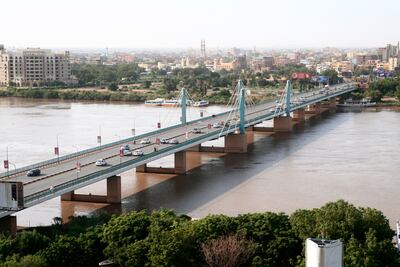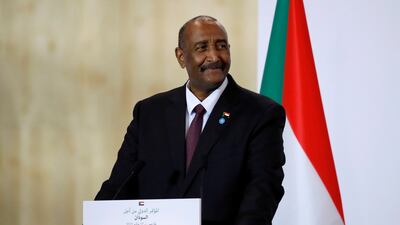Sudan’s head of state and leading soldier on Wednesday reasserted the military’s commitment to the country’s transition to democratic rule.
Gen Abdul Fattah Al Burhan dismissed as unfounded charges that the military had no intention of giving up power.
“We in the military are more concerned and determined that the transitional period be concluded on schedule and democratic elections are held,” he told a graduation ceremony for army commandos.
Gen Al Burhan was speaking a day after the military said it had bloodlessly thwarted an attempted coup by 22 officers led by a general. Authorities said the coup was designed to derail the shift to democratic rule more than two years after dictator Omar Al Bashir was overthrown.
Gen Al Burhan lashed out at politicians, saying no single group can alone lead the vast Afro-Arab nation and calling on the pro-democracy groups behind the popular uprising against Al Bashir to unite for the sake of Sudan’s stability and democratic aspirations.
He also defended the military’s role as the nation’s guardian during the transitional period.
“We don’t have an elected government," he said. "We, in the military, safeguard the unity and security of Sudan as well as the dreams and future of our youths.

“Let us put our hands together and move forward to lay the foundations of a civilian democratic government chosen by the Sudanese people through elections."
Gen Al Burhan served politicians a stern reminder of the military’s might.
“Everything is in our hands,” he declared as he complained of attempts by the civilian-led government to marginalise the military. “My brothers, the politicians, we are the ones who foiled the coup. No one else did.
“The country is big enough for all of us; and, if we act in good faith, we can all live in peace.”

Prime Minister Abdalla Hamdok on Tuesday hinted at divisions between the military and civilian components of the transitional administration that took the reins of power in August 2019.
“The attempted coup requires a full and transparent review of the transition to arrive at a partnership based on the slogans and the principles of the revolution as well as a road that leads only to a democratic and civilian transition,” he said hours after news of the coup broke.
The military and civilian politicians have for months been at loggerheads, with each accusing the other of breaches of authority and being the cause of some of the country's many woes.
Many civilian politicians have complained that Gen Al Burhan was showing the tell-tale signs of a man with long-term political ambitions.
The generals, for their part, have repeatedly accused the government of incompetence, vying for personal gain and of unfairly demonising the military.
The commander of the Rapid Support Forces – a powerful paramilitary outfit led by Gen Al Burhan’s deputy on the Sovereign Council – was more blatant in his criticism of politicians when he addressed the same ceremony on Wednesday.
Gen Mohammed Hamdan Dagalo said politicians were indirectly responsible for the latest attempted coup.
“We in the armed forces receive incessant insults from those who claim to be our partners," he said. "So, no wonder that coups happen when the armed forces don’t get to be respected and appreciated.
“We said it and we will say it again today and tomorrow: we have no ambitions or are after personal gain. We only want our people to live in dignity. Political rivalries and ignoring the needs of the people are the root cause of coups."
Tuesday’s attempted coup underlined the fragility of democratic transition in a country where elected governments and the military have competed for power since independence in 1956.
Army generals seized power from civilian governments in 1958, 1969 and 1989, with the military spending more than 50 years in power. Beside those three successful coups, Sudan has experienced at least two dozen failed attempts, some involving bloodshed.
Tuesday’s attempted coup was the third to be announced by authorities since Al Bashir was overthrown 29 months ago.
It came as Mr Hamdok’s government grappled with a surge in street crime in Khartoum and other major cities and as most Sudanese struggled to cope with rising prices and shortages.
“The politicians have offered a window for coups because they neglected the life and basic services citizens need and became preoccupied with competing for positions of power,” Gen Dagalo said.


